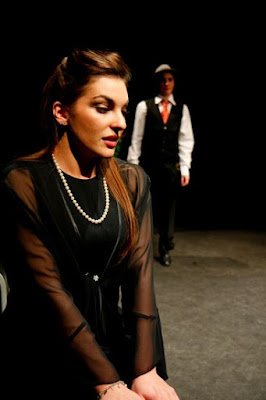There's absolutely nothing like a night at the theatre, especially one as intimate and cozy as
Teatro Belli in Trastevere. (The added bonus that it's five minutes walking from my house also makes it quite attractive.) Last night I had the pleasure of seeing a dozen or so talented and mostly amateur actors treading the boards in
Twelfth Night, one of Shakespeare's lesser-performed comedies.
Eternal Lines is a small English-language theatre company in Rome that puts up a few shows a year, with usually at least one by Shakespeare. For any of you out there who have seen Shakespeare translated into Italian (almost as bad as
Woody Allen in Italian) you'll know how vital this company is for us Anglo-Saxon expats here in Rome. Lucky for us we can count on director Douglas Dean, veteran Shakespearean actor and regular performer at the
Pendley Shakespeare Festival, to give us our at least once-yearly injection of iambic pentameter to keep our pulses steady. The fact that Dean took a part in this production was an added bonus.
 |
| Michael Fitzpatrick as Malvolio |
Highlights of the show were the perfectly played combination of prissiness and ridiculousness of Michael Fitzpatrick as a besotted Malvolio, Rishad Noorani's smug yet likable Duke Orsino and Carolyn Gouger as the saucy and scheming maid Maria. But hands down the most brilliant and enjoyable moments of the night were brought to you by James Butterfield as Sir Andrew Aguecheek and director Douglas Dean as Sir Tobias Belch. Dean and Butterfield's combined energy electrified the stage, their timing was impeccable and their delivery spot-on, every time. They played off each other marvelously and it was a shame every time they walked off stage.
 |
| James Butterfield, Douglas Dean and Shane Hartnett up to no good | | |
 |
| James Butterfield as Sir Andrew |
A few commendable Italian actors, notably Francesca Albanese as Olivia, are to be congratulated for giving credible and fluent performances. In the realm of Shakespeare this is no easy task when English is your first language, much less your second.
 |
| Francesca Albanese as Olivia |
The most surprising performance of the night was by Micky Martin playing Feste, the rambunctious fool who, I must admit, began the show by grating on my nerves with his over-the-top antics. He astonishingly went on to play the mandolin and even the harp with skill and musicality, his singing voice surprisingly clear. By the end he had won the audience's hearts with his passionate playing, off-color jokes and boisterous physical comedy, which, when you think about it, is exactly the role a fool is meant to play. I was doubly impressed when I learned all three of the songs he performed were also his own compositions.
 |
| Micky Martin as Feste |
 |
| Hartnett, Dean and Carolyn Gouger as Maria |
 |
| Angelo Esposito as Sebastian and Emma Lo Bianco as Viola. |
A marvelous night was had by all, and really, with cross-dressing, mistaken identities, forged love letters, pratical jokes, dueling cowards and unrequited love, how could you expect anything less?
Twelfth Night may have closed its run, but there is more to come from Eternal Lines. Their next production,
Waiting for the Parade will be playing 17-22 April at
Teatro San Genesio in Prati.
Liked it? Then share:






















